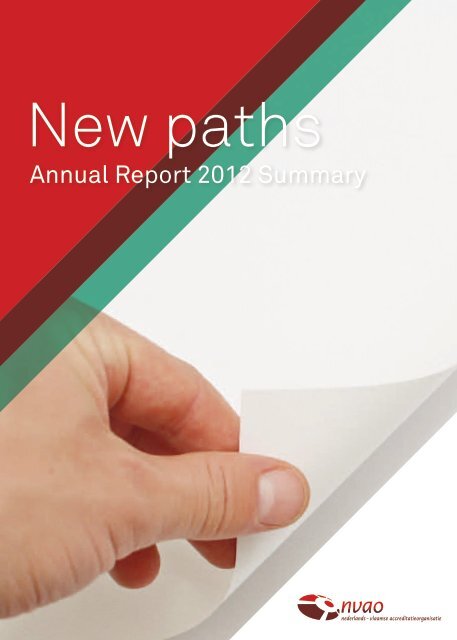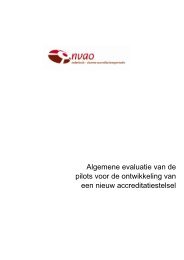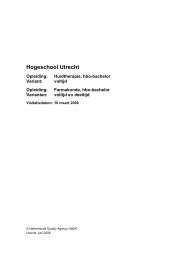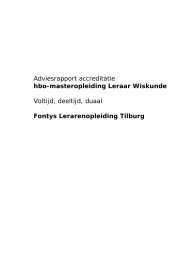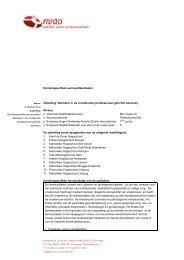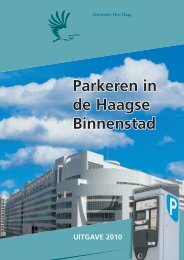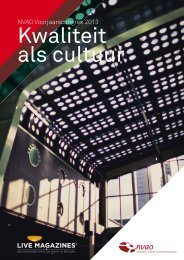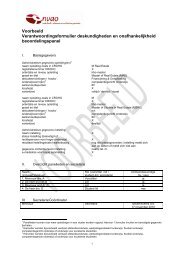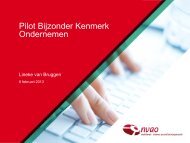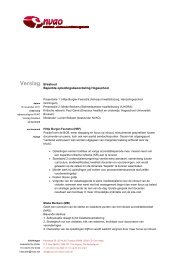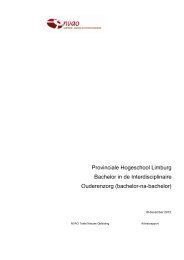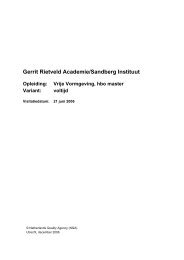Annual Report 2012 Summary - NVAO
Annual Report 2012 Summary - NVAO
Annual Report 2012 Summary - NVAO
Create successful ePaper yourself
Turn your PDF publications into a flip-book with our unique Google optimized e-Paper software.
New paths<strong>NVAO</strong> <strong>Annual</strong> <strong>Report</strong> <strong>2012</strong><strong>Summary</strong>
Introduction4 New paths
1 New Paths 8Developments in the accreditation systems 9Positive result for external review 10New strategy 10Expectations for 2013 102 Key tasks of <strong>NVAO</strong> 122.1 General 132.2 New accreditation systems 132.3 Distinctive (quality) features 142.4 Other activities 152.5 Tables 163 Collaboration with the ‘Profession’ 184 International Cooperation 20Cooperation between the Netherlands and Flanders 21Cooperation in Europe 21International networks 21International projects 215 <strong>NVAO</strong> Organisation 24Executive Board and Advisory Council of <strong>NVAO</strong> 25Internal Quality Assurance 26Organisation (Communication, Computerisation,Staff) 266 Appendix 28List of definitions and abbreviations 29<strong>NVAO</strong> <strong>Annual</strong> <strong>Report</strong> <strong>2012</strong> 7
Chapter 1New Paths8 New paths
‘The improvement period might look like arelaxation in requirements, but it has led tomore clearly defined assessments.’Paul Zevenbergen, <strong>NVAO</strong> board memberIn recent years, Dutch higher educationhas shown that quality has been made atop priority. An increased awareness ofquality is apparent both at institutionsand within programmes. The institutionsthat were confronted with stricter measuresare taking great pains to make thenecessary improvements. To secure thechanges being made, <strong>NVAO</strong> has establisheda number of improvement plans. Theinterim assessments at the programmesconcerned provide confidence; the finalassessments will show next year whetherthe improvements have actually beenachieved.In Flemish higher education, extra measures were notrequired. Yet calls for innovation from society are growing andhigher requirements are being set for the programmes.This is manifested in greater attention being given to researchskills and increased reflection within the programme. It is achallenge to give shape to the continuum – from fundamentalresearch, via practice-orientated research, to activityresearch. The associations and institutions deal with thisdifferently. The necessity of having an initial accreditationpolicy is accepted, but has not yet been completed or consistentlyimplemented everywhere.Developments in the accreditationsystemsThe initial results of the second Dutch accreditation systemindicate that the intended outcomes have been achieved.The possibility of improvement for programmes leads to moreclearly defined panel assessments. <strong>NVAO</strong> has establishedvarious improvement plans. Awareness of the importance of(having) a quality-oriented culture has increased considerably.The programme assessments and institutional audits aregetting off the ground now that the old system has beenphased out. At the programme level, the external assessmentis viewed more as a good discussion between peers. The sameis true at the board level for the discussion partners in respectof the institutional audit for which the institutions thoroughlyprepare themselves. One point of focus is the period established by law when conditions are set for the assessment,particularly for the institutional audit. Within one year, theinstitution must show – by receiving a positive panel assessment– that it has met the conditions set; that is a very shortperiod within which to accomplish this.The tightened stipulations that <strong>NVAO</strong> has introduced to therequirements for the composition of the panel and to theselection of the discussion partners and final projects to beassessed are effective, according to the institutions, theexperts that participate in the panels and the Dutch qualityassessment agencies. The manner in which the externalassessment is conducted is viewed as being more independentand the panels’ assessments are more critical, partly dueto the possibility of recommending a period for improvement.The improvement period might look like a relaxation in requirements,but it has led – as <strong>NVAO</strong> expected it would – to moreclearly defined assessments.The next accreditation system in Flanders will be introducedat the commencement of the 2013-2014 academic year.The most important change from the first system is the introductionof a limited assessment of the programmes, linked toa mandatory institutional review for registered institutions.The limited programme framework has three generic qualityguarantees (standards). The programmes must provide morefactual data with their accreditation application. The firststandard for the intended learning outcomes is issued at leastone year in advance via the subject/discipline-specific learningoutcomes that <strong>NVAO</strong> validates in the Flemish qualificationstructure. The external assessment itself returns to theheart of the matter, the triangle between teacher, student andthe learning environment. That is where education takes placeand also where its quality can be found.The Flemish institutional review assesses the manner inwhich the institution meets the (inter)national social requirementsfor higher education by (controlling) the quality of itseducation. The framework gives a number of themes forthis that serve as points of focus during the audit, such assustainability, diversity, participation and internationalisation.The presence of and attention given to a quality-orientedculture are a focus running through all standards. The institutionalreview is conducted by international panel members.For this, <strong>NVAO</strong> makes use of its pool of international expertsit has built up through its international contacts. Before thestart of the institutional review, Flanders will conductbaseline measurements in the 2015-2016 and 2016-2017academic years. The institutions and associations arecurrently already preparing for this.<strong>NVAO</strong> <strong>Annual</strong> <strong>Report</strong> <strong>2012</strong> 9
‘In addition to focusing on assessing quality,<strong>NVAO</strong> also focuses on encouraging a qualityorientedculture.’Ann Demeulemeester, <strong>NVAO</strong> vice chairpersonA third important change in the new system is the fact that itis now <strong>NVAO</strong>, rather than the Flemish government, that takesthe decision on the improvement period.Positive result for external reviewIn the summer of <strong>2012</strong>, <strong>NVAO</strong> was inspected by an external,international and independent panel of experts. The inspectionhad a positive outcome. In September <strong>2012</strong>, the reviewpanel assessed in its final report that <strong>NVAO</strong> meets theEuropean Standards and Guidelines.<strong>NVAO</strong> has translated its key tasks into strategic agenda pointsand priorities (see box). The positioning of <strong>NVAO</strong> correspondswith the ambitions of the Dutch and Flemish governments,higher education institutions, students, teachers andemployers to provide the best possible higher education to abroad range of students in a rapidly developing environmentand labour market. External quality assurance should fosterthese ambitions. In 2013, the strategic choices will be translatedinto operational goals in the primary and secondaryorganisation processes.<strong>NVAO</strong> should meet these European guidelines, as a qualityassurance organisation, to be and remain a fully fledgedmember of the European Association for Quality Assurance inHigher Education (ENQA) and (again) to be registered on theindependent European register of quality assurance agencies(European Quality Assurance Register for Higher Education -EQAR). ENQA has renewed the membership of <strong>NVAO</strong> for fiveyears and, at the end of <strong>2012</strong>, EQAR announced that <strong>NVAO</strong>’sregistration on its register had been renewed.<strong>NVAO</strong> will inform ENQA at the end of 2014 about the improvementsmade with regard to system-wide analyses and theimprovement of the consistency in panel assessments byintroducing the possibility of clustered assessments ofprogrammes in the Netherlands as well. This last pointdepends on legal decision-making.New strategyIn <strong>2012</strong>, <strong>NVAO</strong> started developing a new policy strategy for thecoming four years. In addition to assessing future-orientedquality assurance within institutions and the results ofprogrammes based on past performance, <strong>NVAO</strong> will also focuson promoting a quality-oriented culture in higher educationand international cooperation. The goal here is to facilitateinstitutions and programmes: they remain the primary onesresponsible for the quality of the education provided and themanner in which this is achieved.10 New paths
‘The external assessment in the new Flemish accreditationsystem returns to the heart of the matter, the trianglebetween teacher, student and the learning environment.That is where education takes place and also where itsquality can be found.Lucien Bollaert, member of <strong>NVAO</strong> BoardExpectations for 2013With the exception of the Nautical College and the artprogrammes provided by a “School of Arts” attached to auniversity college, the Master’s programmes at the Flemishuniversity colleges will be embedded in the universities in2013 (embedding in research). Preparing for this was noteasy for the programmes. <strong>NVAO</strong> launched many follow-upplans to gain substantiated confidence that, by that time, theprogrammes will be up to standard in academic terms.The balance between professional and academic orientationwill remain a challenge after the integration, also becauseuniversity colleges will continue to be given the task ofconducting practice-oriented scientific research.The Associate Degree programmes are expected to be anofficial part of higher education in the Netherlands fromthe end of 2013. <strong>NVAO</strong> is developing a new assessmentframework for this. Until that time, the Associate Degreeprogrammes have a temporary status.In 2013, the Flemish government is preparing a legislativeAct to strengthen professional higher education, the newHBO5 programmes.The Flemish government has consented to the extension ofthe programme length for Master’s programmes when longerprogrammes are required with a view to the (inter)nationallabour market or the further development in a research environment(doctorates, R&D conducted by companies). In 2013,universities and university colleges can submit an applicationfor extending the length of their Master’s programmes with<strong>NVAO</strong>.For <strong>NVAO</strong> itself, 2013 will be a busy year. The new managementteam is fleshing out the policy strategy, the majority ofthe Dutch institutional audits are taking place, the applicationsfor programme length extensions can be submitted to<strong>NVAO</strong> and an information round will be held on the newFlemish accreditation system with the Flemish Ministry ofEducation and Training and the VLUHR. At the same time,there will be an increased call on the analytical and reflectioncapacities of <strong>NVAO</strong> to come up with good analyses and recommendationsbeyond the perspective of education. <strong>NVAO</strong> isexpanding its system of broad analysis and, in this effort, hasbegun in two subjects/disciplines.<strong>NVAO</strong> <strong>Annual</strong> <strong>Report</strong> <strong>2012</strong> 11
Chapter 2Key Tasksof <strong>NVAO</strong>12 New paths
Chapter 3Cooperationwith the‘Profession’18 New paths
‘The longer – and therefore more sustained –a graduate can function well in society,the higher the quality of the programme.For <strong>NVAO</strong>, quality and sustainability go handin hand.’Ann Demeulemeester, <strong>NVAO</strong> vice chairperson<strong>NVAO</strong> strives to maintain good relationships and opencommunication in society and with its stakeholders, such asthe Dutch and Flemish governments, higher education institutionsand programmes, umbrella organisations and studentorganisations, quality assessment agencies, employers andemployee organisations, secretaries and chairpersons ofpanels. In addition to the transfer of knowledge and themutual exchange of experiences via meetings and conferences,the primary focus since <strong>2012</strong> has been making moreexplicit the balance between the independent, clear andcritical (‘fair’) assessment and the promotion of continualquality improvement.With the Dutch quality assessment agencies and the Flemishquality assessment agencies – the Flemish InteruniversityCouncil (Vlaamse Interuniversitaire Raad – VLIR), the Councilof Flemish University Colleges (Vlaamse Hogescholenraad –VLHORA) and the Flemish Council of Universities and UniversityColleges (Vlaamse Universiteiten en HogescholenRaad – VLUHR), the merger organisation of the quality assurancecells of the VLIR and the VLHORA – <strong>NVAO</strong> periodicallydiscusses the implementation of the assessment procedures.<strong>NVAO</strong> participates in the Steering Committee on learningoutcomes of the VLUHR as an observer.In Flanders, the VLUHR is responsible, in consultation with<strong>NVAO</strong>, for training the Flemish panel members, (external)secretaries and process coordinators. In the spring of <strong>2012</strong>,the first intervision on this took place. In the Netherlands,<strong>NVAO</strong> trains and certifies the external secretaries/processcoordinators (currently 193 in total). Also, up to now 43 (vice)chairpersons have been trained, on invitation, for the auditpanels in the context of the institutional quality assuranceaudits. People from outside higher education are also invitedfor this in order to avoid the potential dangers of “organisationalblindness”. <strong>NVAO</strong> publishes these names on its website.<strong>NVAO</strong> organised two intervision meetings for the certifiedsecretaries in <strong>2012</strong>.<strong>NVAO</strong> wants to increase the accessibility of this qualityinformation. This is important in both the Netherlands andFlanders in view of the growing demand for achieving adistinction between institutions and programmes.<strong>NVAO</strong> regularly consults with both governments and with theNetherlands Education Inspectorate. The Inspectorate and<strong>NVAO</strong> want to complement one another in their work.This means that the Inspectorate fulfils a supervisory role,primarily from the perspective of legislation and regulations,and funding. <strong>NVAO</strong> assesses the quality of the programmesand, for the institutions that have registered for the institutionalaudit, the degree to which they are in control of theireducational activities. For <strong>NVAO</strong>, the guiding principle isearned trust. This starting point also serves as the basis forthe cooperative agreement that <strong>NVAO</strong> and the Inspectorateconcluded in <strong>2012</strong>. At the end of 2013, both parties will assesswhether the protocol needs to be revised.<strong>NVAO</strong> and the Flemish Agency for Quality Assurance in Educationand Training (AKOV) will hold consultations on the rolloutof the Flemish qualification structure. <strong>NVAO</strong> provides therecognised qualifications that contain subject/disciplinespecificlearning outcomes to AKOV so that they can be placedin the qualification databank.In the Advisory Council of <strong>NVAO</strong>, all stakeholders arerepresented. The advisory council advises <strong>NVAO</strong> periodicallyconcerning its policy and activities.<strong>NVAO</strong> maintains contacts with students at different levels.Periodic consultation is held with the Dutch NationalStudents Association (Interstedelijk Studenten Overleg – ISO),the Dutch National Union of Students (Landelijke StudentenVakbond – LSVb) and the National Union of Students inFlanders (Vlaamse Vereniging van Studenten – VVS). Thestudent organisations are also represented on the AdvisoryCouncil of <strong>NVAO</strong>. <strong>Annual</strong> training and “reunion days” are heldfor the student panel members. <strong>NVAO</strong> publishes its decisionson programmes on its website for the benefit of students.<strong>NVAO</strong> <strong>Annual</strong> <strong>Report</strong> <strong>2012</strong> 19
Chapter 4InternationalCooperation20 New paths
‘The Netherlands and Flanders recognise one another’sdegrees and diplomas in both Bachelor’s andMaster’s programmes in profession-oriented andacademic-oriented education and in art education.It is a first in Europe.’Lucien Bollaert, member of <strong>NVAO</strong> Executive BoardCooperation between the Netherlandsand FlandersIn December <strong>2012</strong>/January 2013, the Kingdom of the Netherlandsand the Flemish Community of Belgium signed theprotocol for revising the Treaty of 2003. This provides guaranteesregarding the Dutch institutional quality assurance auditand the Flemish institutional review in the new accreditationsystems. At the same time, the Dutch and Flemish Bachelor’sand Master’s programmes in both profession-oriented andacademic-oriented education and in art education arerendered equal to one another. The mutual recognition of oneanother’s degrees and diplomas between the Netherlandsand Flanders is a first in Europe.Cooperation in EuropeAt the European level, the extra value of the internationalactivities of <strong>NVAO</strong> for Dutch and Flemish higher education is akey point of focus. In its strategic policy, <strong>NVAO</strong> has determinedthat the international perspective is one of its priorities.Among other things, this means that <strong>NVAO</strong> seeks activecooperation with reliable, leading international partners,develops instruments to increase this international cooperationand promotes the mutual recognition of diplomas atthe international level. In addition, through internationalcooperation, <strong>NVAO</strong> aims to find the best possible forms ofexternal quality assessment.International networks<strong>NVAO</strong> participates in three international networks of qualityassurance organisations in higher education. <strong>NVAO</strong> is amember of the board of the International Network for QualityAssurance Agencies in Higher Education (INQAAHE), the EuropeanConsortium for Accreditation in Higher Education (ECA)and the European Quality Assurance Register for HigherEducation (EQAR). Up to and including October <strong>2012</strong>, <strong>NVAO</strong>was a part of the board of the European Association for QualityAssurance in Higher Education (ENQA). <strong>NVAO</strong> also sits on thequality assurance commission of the National CoordinationPoint NLQF of the Dutch Ministry of Education, Culture andScience (for Flanders, <strong>NVAO</strong> ranks the subject/disciplinespecificlearning outcomes of all Bachelor’s and Master’sprogrammes at the Flemish and European qualificationlevels).For the Netherlands, <strong>NVAO</strong> also participates in the StructuralReforms Working Group, which reports to the Bologna Follow-Up Group set up by the European ministers on the implementationof measures announced in the Bucharest Communiquéin the areas of quality assurance, recognition and qualificationframeworks, among others.The membership in these networks also contributes tobuilding up relationships with experts that can participatein different assessments.International projectsIn the year under review, <strong>NVAO</strong> focused on different internationalprojects. One of the successful international projectscarried out under the coordination of <strong>NVAO</strong> with a subsidyfrom the European Commission is the ECA project EuropeanTraining of QA Experts (E-TRAIN) (completed in <strong>2012</strong>), in whicha European training programme for experts and policyemployees was set up and a databank was developed withexperts from different countries. Another project, also coordinatedby <strong>NVAO</strong>, is the ECA project Quality Assurance andRecognition of degrees awarded (JOQAR), in which both theaccreditation and the recognition of diplomas of jointprogrammes is facilitated (to be completed in 2013).Distinctive (quality) feature of internationalisationAfter completion of the pilot project for the distinctive (quality)feature of internationalisation and the establishment of thedefinitive assessment framework, the first distinctive featureof internationalisation could be awarded at the institutionallevel in <strong>2012</strong> after a positive institutional quality assuranceaudit. As an addition to the feature, <strong>NVAO</strong> introduced the GoodPractices in Internationalisation Platform (GPIP) in <strong>2012</strong> inwhich Dutch and Flemish higher education programmes canshare experiences in the area of internationalisation. The goodpractices pertain to (one of) the five standards of the distinctive(quality) feature of internationalisation: vision, learningoutcomes, teaching & learning, staff and students. <strong>NVAO</strong> alsoparticipates in the steering committee of Nuffic and Flamencothat promotes good practices in internationalisation by organisingbiannual workshops for Dutch and Flemish institutions.The feature received a European follow-up in <strong>2012</strong> when theproject Certificate for the Quality of Internationalisation(CeQuInt), submitted by <strong>NVAO</strong>, was approved by the executiveagency of the European Commission. CeQuInt aims to assessthe internationalisation at the European level and to award itwith a European Certificate of Internationalisation. Theproject is being carried out by a consortium of fourteen partnersfrom Germany (2), Finland, France (2), Croatia, Austria,Poland, Slovenia and Spain (2), the Academic Cooperation<strong>NVAO</strong> <strong>Annual</strong> <strong>Report</strong> <strong>2012</strong> 21
Association (ACA) and the German Academic ExchangeService (DAAD). <strong>NVAO</strong> is coordinating the project.ARQATAUp to May 2014, <strong>NVAO</strong> will be carrying out the project ARQATA(Armenia Quality Assurance Technical Assistance) in Armenia.It is funded by the World Bank. <strong>NVAO</strong> is providing Armenianuniversities with technical support in the development oftheir quality assurance system. <strong>NVAO</strong> is also supporting theNational Center for Professional Education Quality Assurance(ANQA, the Armenian quality assurance organisation) withthe further professionalisation of the organisation and withpreparations for their international external review on thebasis of the ENQA principles.In <strong>2012</strong>, in addition to two congresses, various trainingsessions and workshops were held with ANQA and eightuniversities. <strong>NVAO</strong> also organised two study visits forArmenian delegations to the Netherlands and Flanders(September <strong>2012</strong>) and Switzerland (October <strong>2012</strong>). In June2013, under the management of <strong>NVAO</strong> chairpersons,two institutional audits and three programme assessmentswill be organised; in September 2013, ANQA will be subjectedto a proof audit.For the ARQATA project, <strong>NVAO</strong> is collaborating with expertsfrom the Netherlands and abroad: HanzehogeschoolGroningen, Delft University of Technology, Hogeschool-Universiteit Brussel, University of Leiden, University ofMaastricht, Vrije Universiteit Brussel, ECA, ENQA and qualityassurance organisations from England (Quality AssuranceAgency for Higher Education - QAA) and Switzerland (Organfür Akkreditierung und Qualitätssicherung - OAQ).Other activitiesAt the request of the Surinamese accreditationorganisation NOVA (in formation), <strong>NVAO</strong> assessed aprogramme provided by the Anton de Kom Universityin Paramaribo.<strong>NVAO</strong> organised the seminar Good Practices inInternationalisation for the representatives of highereducation institutions, umbrella organisations andstudent organisations who are specialised in internationalisation.At this seminar the Good Practices inInternationalisation Platform was also introduced.In the context of the E-TRAIN-project, <strong>NVAO</strong> gave apresentation during a conference on training panelmembers in Madrid.As the organiser/committee member, <strong>NVAO</strong> wasinvolved in the external ENQA reviews of the Spanishaccreditation organisation Agencia Nacional deEvaluación de la Calidad y Acreditación (ANECA)and the Swedish QAgency.<strong>NVAO</strong> participates in the European ENQA researchproject in order to come up with recommendationsfor involving the stakeholders in higher educationin quality assurance with the aim of creating moreexternal impulses and responsiveness in qualityassessment.<strong>NVAO</strong> is working with Flamenco/Flanders KnowledgeArea vzw and Nuffic in a series of workshops ongood practices in internationalisation. These workshopsare held alternately in Flanders and in theNetherlands.22 New paths
Chapter 5<strong>NVAO</strong>Organisation24 New paths
In <strong>2012</strong> various changes were made at themanagement level of <strong>NVAO</strong>. The strategicpolicy was also revised.These changes, in addition to the regular tasks and extratasks, the preparations for the external review and therestructuring of operations as a result of the new Dutch andFlemish accreditation systems, led in the year under review toconsiderable pressure being placed on the organisation, bothon the staff and financially.The regular budget of <strong>NVAO</strong> has, of course, increased negligiblyin these economic times. This means that room tomanoeuvre is being sought in the efficiency and effectivenessof the organisation and within the organisation. In the yearunder review, attention has been given to the development ofan internal quality-oriented culture through slimmed-down,but efficient internal quality assurance. In the years to come,new tasks and (international) projects must fit in with thestrategic policy of <strong>NVAO</strong> and contribute to the quality-orientedculture within and the visibility of Dutch and Flemish highereducation.Executive Board and Advisory Councilof <strong>NVAO</strong>On 1 July <strong>2012</strong>, Vice Chairman em. Prof. Dr G. Langouche lefton reaching the end of his term of appointment. On the occasionof his departure in July, <strong>NVAO</strong> organised the symposium"The importance of research for education" at KU Leuven.Chairman Dr K.L.L.M. Dittrich left on 1 December <strong>2012</strong> for theAssociation of Universities (VSNU), where he was appointed asChairman and successor of Dr S. Noorda. In November, <strong>NVAO</strong>organised a farewell reception for him in The Hague.In <strong>2012</strong>, <strong>NVAO</strong> also said good-bye to Ms Prof. Dr P.L. (Pauline)Meurs, Ms I. (Iris) van Riet and Messrs mr. E. (Eric) Derycke andlic. G.E.D. (Gilbert) Vanleenhove as members of the Board andto Ms H.A.M.F. (Heleen) Keijzer-Lambooy and Messrs T. (Toon)Martens, R. (Rudy) Van Renterghem, T. (Ton) Van den Brandeand P. (Paul) Verboven as members of the <strong>NVAO</strong> AdvisoryCouncil.<strong>NVAO</strong> BoardThe Board of <strong>NVAO</strong> consists of a maximum of15 members. The Chair and a maximum of four othermembers make up the Executive Board.Board members are appointed for a term of four yearsby the Committee of Ministers (the Dutch andFlemish Ministers responsible for higher education).The board members have expertise in the field ofhigher edu cation, the professional practice of highereducation, scientific research or the area of qualityassurance. The Board decides on the policy, themanagement regulations, the budget, the annualreport and the annual accounts and the decisionsthat are open to external appeal. In addition, theBoard provides guidelines for the structure of theorganisation, information provision and the financialeconomicrunning of the organisation. The ExecutiveBoard directs the organisation on a daily basis andis accountable to the Board for its actions.<strong>NVAO</strong> Advisory CouncilThe Board appoints an Advisory Council that providesun solicited or requested recommendations on generalpolicy. The members of the Advisory Council areappointed for a maximum term of three years andcome from the circles of: the Association ofUniversities in the Netherlands (VSNU), the NetherlandsAssociation of Universities of Applied Sciences(HBO-raad), the Dutch Training and Education Council(NRTO), the Flemish Interuniversity Council (VLIR),the Council of Flemish University Colleges (VLHORA) –now combined into VLUHR, the Dutch NationalStudents Association (ISO), the Dutch National Unionof Students (LSVb), the Flemish Union of Students(VVS) and the Flanders Social and Economic Council(SERV).On 1 November <strong>2012</strong>, the Committee of Ministers appointedMessrs mr. drs. B.J. (Bruno) Bruins and drs. J.A.C.F. (Jasper)Tuytel as members of the Board of <strong>NVAO</strong>.<strong>NVAO</strong> <strong>Annual</strong> <strong>Report</strong> <strong>2012</strong> 25
Composition of <strong>NVAO</strong> Board(in alphabetical order, 31 December <strong>2012</strong>)Lucien Bollaert (member of Executive Board)Bruno BruinsEric DeryckeKoen GevenClaire TillekaertsIris van RietPaul van RoonJasper TuytelGilbert VanleenhovePaul Zevenbergen (member of Executive Board)Composition of <strong>NVAO</strong> Executive Board(in alphabetical order, 31 December <strong>2012</strong>)Lucien BollaertPaul ZevenbergenComposition of <strong>NVAO</strong> Advisory Council(in alphabetical order, 31 December <strong>2012</strong>)Remie BolteDirk BroosGertjan DewaeleHenk de GreefTon van HaaftenToon MartensHarry MartensTessa TimmermansRudy Van RenterghemPaul Verboven(deputy members)Hugo DeckersPaul GeerlingsNele MuysLuc Van de VeldeChanges in 2013In December <strong>2012</strong>, the Committee of Ministers appointedMs lic. A.M.J. (Ann) Demeulemeester as a member of theExecutive Board of <strong>NVAO</strong> effective 1 January 2013.The Committee of Ministers appointed Ms lic. M. (Mia)De Schamphelaere, Ms Dr B.E. (Lieteke) van Vucht Tijssen andMessrs em. Prof. R. (Ruddy) Doom and lic. B. (Bart) Maes asmembers of the Board of <strong>NVAO</strong> effective 1 February 2013.Ms lic. C. (Claire) Tillekaerts was appointed for another fouryears as a member of the Board.On 6 February 2013, the Committee of Ministers appointedMs Demeulemeester as Vice Chair and Dr A.H. (Anne) Fliermanas Chair of <strong>NVAO</strong>. Mr Flierman took office on 1 May 2013.Internal Quality AssuranceThe internal quality assurance system of <strong>NVAO</strong> is based onthe European Foundation for Quality Management (EFQM)and operates on a cycle of two years. At the end of <strong>2012</strong>, aquality report was drafted – below is a summary of this report.The 2010-<strong>2012</strong> period saw a number of developments andactivities that were significant for the internal qualityassurance of <strong>NVAO</strong>. Work was done on the objectives in theareas of “Leadership, strategy and policy” and the primaryand secondary tasks that underlie them. Parallel to this,internal discussion days were organised that focused onthe policy strategy, the quality-oriented culture and theidentification of bottlenecks and opportunities. A startwas also made on the improvement of the decisions andadvisory reports. The internal handbooks now focus onthe substantive support of the person in charge.The layout of decisions and the administrative informationin the decision have been simplified and the summary of theadvisory report has been included in the decision. The qualityof the accreditation reports has improved due to the newrequirements for reporting and the training of secretaries.The templates have also been improved and last year theadvisory reports for the institutional quality assurance auditwere reviewed. The improvement of the quality of the advisoryreports for new programmes will continue to be a point ofattention.In <strong>2012</strong>, a self-evaluation report was developed for theexternal review of <strong>NVAO</strong> by the international audit committeeof ENQA, see also Chapter 1. The self-evaluation reportpresents the strengths of <strong>NVAO</strong>: <strong>NVAO</strong> is a respected organisation,is flexible and proactive and distinctly collaborative.The report also named the points needing attention:the administrative load of the accreditation system shouldbe limited; the consistency of the assessment and decisionmakingrequires attention, as do the deadlines, and in thearea of the system-wide analysis, improvements can be made.Finally, as a binational organisation, <strong>NVAO</strong> can optimise itssignificance for the intended strong cooperation in highereducation between the Netherlands and Flanders.26 New paths
OrganisationCommunicationThe visibility of <strong>NVAO</strong> in Dutch and Flemish higher educationhas increased due to the socially experienced need for qualityimprovement in Dutch higher education and internalinitiatives, such as various news reports, information rounds,conferences and meetings in the Netherlands and Flanders,the provision of personal information and (online) feedbackrounds. From the side of <strong>NVAO</strong> last year, the primary focus wasnews reports on the completed decision-making, the changesto the board, the development of the new Flemish accreditationsystem, the progress of various (international) projects,the new cooperation protocol with the Dutch Inspectorate ofEducation and the external review of <strong>NVAO</strong>.In <strong>2012</strong>, communication surrounding international activitiesimproved. Various policy employees were intensively involvedin international projects and regular reports were made oncurrent business via intranet. The English-language informationprovided on the <strong>NVAO</strong> website has been updated.The annual seminars on internationalisation were attendedwell by Dutch and Flemish representatives of highereducation institutions and umbrella organisations.Board members and international policy employeesactively attended a number of foreign forums last year.well and the hardware was replaced after five years of service.Finally, the IT team was reorganised and (temporarily)expanded and, in addition to an IT steering committee, a usersgroup was set up.StaffAs a result of the findings of the first employee satisfactionstudy, the employment conditions were improved in <strong>2012</strong> onthe basis of a risk inventory and evaluation (RI&E). An integritypolicy was also developed. In the assessment system, thefunction and competency profiles of staff and support staffwere reformulated to improve the quality of assessments.In order to improve the quality of the performance andassessment process, in <strong>2012</strong> the function and competencyprofiles for the staff and support positions were reformulatedsubsequent to those of the policy employees.In <strong>2012</strong>, two policy employees (Dutch/Flemish) were recruited.Job vacancies were also filled for the head of the financesdepartment, the department of Internationalisation and thedevelopment of system-wide analyses. Last year, <strong>NVAO</strong> calledin two external advisors in the areas of computerisation andorganisation/communication and made use of a small groupof regular temp/standby employees for operations, catering/logistics and IT.<strong>NVAO</strong> publishes its decisions and the accompanyingassessment reports, and/or panel reports on theprogrammes it has assessed in the databank on thewebsite www.nvao.com. The <strong>NVAO</strong> databankexchanges data from accredited programmes withthe databanks of the Flemish Higher EducationRegister (www.hogeronderwijs.be) and the EuropeanQrossroads (www.qrossroads.eu).ComputerisationIn <strong>2012</strong>, <strong>NVAO</strong> replaced the internal IT system after ten yearsof service. The new system is geared towards operations,which increases the efficiency with which applications areprocessed. The modernisation of other IT structures was alsobegun, including a databank and the data management ofpanel members and relations. The databank should also beable to serve as the basis for accessible external communicationstailored to different target groups and accreditationdata. In the year under review, the servers were renewed as<strong>NVAO</strong> <strong>Annual</strong> <strong>Report</strong> <strong>2012</strong> 27
Hoofdstuk 6Appendix28 New paths
List of definitions and abbreviationsAKOVANQAARQATACeQuIntCDHOCROHODUOECAECTSENQAEFQMENICEQARESGEUADutch quality assessment agencyFlemish quality assessment agencyGPIPHORInspectorateINQAAHEISOJOQARKNAWLSVbNARICNRTONUFFIC<strong>NVAO</strong>RI&ESERVVHVLHORAVLIRVLORVLUHRVSKVSNUVVSWHWAgentschap voor Kwaliteitszorg in Onderwijs en Vorming(Flemish Agency for Quality Assurance in Education and Training)National Center for Professional Education Quality AssuranceArmenia Quality Assurance Technical AssistanceCertificate for the Quality of InternationalisationCommissie Doelmatigheid Hoger Onderwijs(Committee for Effective Higher Education)Centraal Register Opleidingen Hoger Onderwijs(Central Register of Higher Education Study Programmes)Dienst Uitvoering Onderwijs (Education Executive Agency)European Consortium for Accreditation in higher educationEuropean Creditpoint Transfer SystemEuropean Association for Quality Assurance in Higher EducationEuropean Foundation for Quality ManagementEuropean National Information CentreEuropean Quality Assurance RegisterEuropean Standards and GuidelinesEuropean University AssociationIndependent agency conducting external assessmentsVLIR, VLHORAGood Practices in Internationalisation PlatformHogeronderwijsregister (Higher Education Register)Education InspectorateInternational Network for Quality Assurance Agencies in Higher EducationInterstedelijk Studenten Overleg (Dutch National Students Association)Quality Assurance and Recognition of degrees awardedKoninklijke Nederlandse Akademie van Wetenschappen(Royal Netherlands Academy of Arts and Sciences)Landelijke Studenten Vakbond (Dutch National Union of Students)National Academic Recognition Information CentreNederlandse Raad voor Training en Opleiding (Dutch Training and Education Council)Nederlandse organisatie voor internationale samenwerking in het hoger onderwijs(Netherlands organisation for international cooperation in higher education)Nederlands-Vlaamse Accreditatieorganisatie(Accreditation Organisation of the Netherlands & Flanders)Risico-inventarisatie en –evaluatie (Risk Inventory & Evaluation)Sociaal-Economische Raad van Vlaanderen (Flanders Social and Economic Council)Vereniging Hogescholen (The Netherlands Association of Universities of Applied Sciences)Vlaamse Hogescholenraad (Council of Flemish University Colleges)Vlaamse Interuniversitaire Raad (Flemish Interuniversity Council)Vlaamse Onderwijsraad (Flemish Education Council)Vlaamse Universiteiten en Hogescholen Raad(Flemish Council of Universities and University Colleges)Vlaamse Scholierenkoepel (Flemish Pupils Association)Vereniging van Universiteiten (Association of Universities in the Netherlands)Vlaamse Vereniging van Studenten (National Union of Students in Flanders)Wet op het hoger onderwijs en wetenschappelijk onderzoek(Dutch Higher Education and Research Act)<strong>NVAO</strong> <strong>Annual</strong> <strong>Report</strong> <strong>2012</strong> 29
Colophon<strong>NVAO</strong> <strong>Annual</strong> <strong>Report</strong> <strong>2012</strong>© July 2013Text: <strong>NVAO</strong>Design: Smidswater<strong>NVAO</strong>Nederlands-Vlaamse Accreditatieorganisatie (<strong>NVAO</strong>)Accreditation Organisation of the Netherlands and Flanders (<strong>NVAO</strong>)Parkstraat 28 / 2514 JK Den HaagP.O. Box 85498 / 2508 CD The HagueThe NetherlandsT +31 70 312 2300F +31 70 312 2301info@nvao.netwww.nvao.net30 New paths
<strong>NVAO</strong>Nederlands-Vlaamse AccreditatieorganisatieAccreditation Organisation of the Netherlandsand Flanders (<strong>NVAO</strong>)Parkstraat 28 / 2514 JK Den HaagP.O. Box 85498 / 2508 CD The HagueThe NetherlandsT +31 (0)70 312 23 00F +31 (0)70 312 23 01E info@nvao.netwww.nvao.net


